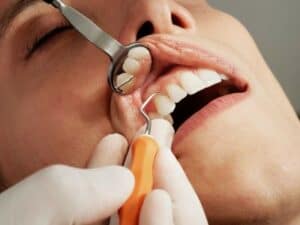
21 Jan What To Expect When Getting Your Wisdom Tooth Removed
Wisdom Tooth Removal – What to Expect Before, During, & After
If you’re like most people, you probably don’t look forward to getting your wisdom teeth removed. But there’s no need to worry! Here’s everything you need to know about getting your wisdom teeth removed so that the experience is as smooth and painless as possible.
The importance of getting your wisdom teeth removed
When it comes to wisdom teeth, many individuals are faced with a choice – keep them or remove them. Removing your wisdom teeth is an important decision and should not be taken lightly. Not only does removal of the wisdom teeth ease crowding in the mouth and stop displacement of other teeth, but it also helps avoid infection and gum disease. What’s more, getting your wisdom teeth removed can help protect you from potential orthodontic problems later on in life. However, individual results may vary depending on the patient’s medical history and other underlying conditions. Consulting with a reliable dentistry specialist is always advised before proceeding with any type of oral surgery.
What to expect before the procedure
Before a procedure is carried out, the patient should know the details of which it consists of, any potential side effects they may experience afterwards, as well as tips on how to prepare for the procedure. The doctor will most likely conduct tests prior to the procedure and explain exactly what to expect. They’ll provide instructions for necessary steps including abstaining from eating and/or drinking within so many hours before it starts. It’s also important to ask questions about anything that’s unclear and make sure you are aware of any allergic reaction risks linked to the anesthesia or other drugs that may be administered. Lastly, it’s essential to know when the patient should begin their post-procedure recovery routine. Planning beforehand not only helps in ensuring a successful outcome but also makes the entire process much less daunting.

How the procedure is performed
The procedure itself is relatively straightforward. First, an anesthetic will be applied to the affected area so that the patient is comfortable throughout the process. Then, a small incision will be made in the skin to access the joint space. The doctor will then insert specialized instruments into this joint space to repair or reconstruct any damaged tissue or bones. In some cases, rebuilding of cartilage may need to be done as well. After treatment is complete, the area will be stitched up and girded with special bandages to protect from infection and support healing. With this procedure, recovery time can vary from person to person depending on their own individual circumstances – but typically takes 6-8 weeks with physical therapy for optimum results.
What to expect after the procedure
After a medical procedure, it is normal to feel tired and possibly sore. It’s important to follow your doctor’s guidelines for what to do after the procedure, including any rest and activity restrictions. Depending on the procedure, you may be able to go home afterwards or you may have to stay in the hospital overnight. Pain management is an important part of recovery and you can expect to receive pain medication if necessary. Your doctor should provide specific instructions on what symptoms need to be watched for in order to prevent complications. If needed, regular follow-up visits will also help ensure that your healing process goes smoothly.
Tips for recovery after wisdom tooth removal
After having your wisdom teeth removed, the most important thing you can do to ensure a successful recovery is to follow your dentist or oral surgeon’s post-operative instructions. This includes avoiding using a straw for drinking, and refraining from eating hard or chewy foods for several days following the procedure. It’s also very important to practice regular mouth hygiene such as brushing and flossing every day. Be sure to rinse your mouth with a non-alcoholic mouthwash twice a day – once in the morning and again at night before bedtime – and use an antiseptic rinse two to four times per day after meals. Additionally, applying ice packs around the area where your tooth was removed may help reduce swelling or discomfort caused by the surgery. With some TLC and patience, you’ll be on the road to recovery in no time!

Frequently Asked Questions
What supplies do you need to get through the healing process of a wisdom tooth removal?
You will need to have a few supplies on hand in order to ensure a successful recovery after your wisdom tooth removal. These items include an antiseptic rinse, non-alcoholic mouthwash, gauze sponges, ice packs, and over-the-counter painkillers as needed. Additionally, it’s also important to follow the instructions of your dentist or oral surgeon, such as eating soft foods and avoiding any strenuous activities.
When should you call the dentist about a problem after a wisdom tooth removal?
It’s important to contact your dentist as soon as possible after a wisdom tooth removal if you experience any unusual or concerning symptoms. This includes excessive bleeding, fever, facial swelling, pain that fails to respond to painkillers, soreness that lasts longer than expected, or signs of infection such as redness and discoloration around the extraction site. Your dentist will be able to provide further advice and answer any questions you may have about the healing process.
What is dry socket and how do you prevent it?
Dry socket (alveolar osteitis) is a common complication of wisdom tooth extraction that can occur when the healing process is disrupted. Symptoms include pain, bad breath, and an unpleasant taste in the mouth. To prevent dry socket from occurring, it’s important to follow your dentist or oral surgeon’s post-operative instructions carefully, such as avoiding the use of a straw and rinsing your mouth with an antiseptic rinse two to four times a day. Additionally, applying icepacks around the area where your tooth was removed may help reduce swelling or discomfort caused by the surgery. If you experience any concerning symptoms after your wisdom tooth extraction, be sure to contact your dentist as soon as possible.

What are common care instructions for wisdom tooth removal?
Common care instructions following a wisdom tooth removal typically include avoiding the use of a straw for drinking anything, refraining from eating hard or chewy foods for several days after the procedure, and practicing regular mouth hygiene such as brushing and flossing every day. Additionally, it’s important to rinse your mouth with a non-alcoholic mouthwash twice a day – once in the morning and again at night before bedtime – and use an antiseptic rinse two to four times per day after meals. Applying ice packs around the area where your tooth was removed may help reduce any swelling or discomfort caused by the surgery.
Does food affect the healing process after wisdom tooth removal?
Yes, what you eat and drink can have an effect on the healing process following a wisdom tooth extraction. It’s important to avoid eating hard or chewy foods, as this can cause disruption during the healing phase. Additionally, it is advised to avoid drinking through a straw, as this can dislodge the blood clot that is necessary for healing. Eating soft foods such as soups, mashed potatoes, cooked pasta and rice, or plain yogurt are all good options for post-operative nutrition. Additionally, make sure to stay hydrated by drinking plenty of fluids such as water and fruit juice.
In Conclusion
Wisdom teeth removal is a common procedure that can have a big impact on your oral health. It’s important to be prepared for the surgery and know what to expect before, during, and after the procedure. With proper care, you can recover quickly and avoid any complications. If you have any concerns about wisdom teeth removal, talk to your dentist or oral surgeon. They can answer your questions and help you make the best decisions for your oral health.


Sorry, the comment form is closed at this time.